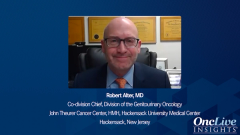
Front-Line Lenvatinib + Pembrolizumab Combination Regimens for Advanced RCC: Selecting Patients and Dose
A review of the first-line I/O-TKI combination regimens available for advanced RCC and selecting the right patients and dose for treatment with lenvatinib and pembrolizumab.
Episodes in this series

Robert Alter, MD: We’re going to start by discussing the therapy options that I thought about using. We’re blessed to have several options of first-line systemic therapy utilizing an I/O [immuno-oncology]–TKI [tyrosine kinase inhibitor] regimen. As far as risk categorizations, it’s approved and favorable in intermediate- and poor-risk [disease], so one doesn’t stand out more than the other. With the opportunity of using lenvatinib and pembrolizumab, our options of using axitinib and pembrolizumab or cabozantinib and nivolumab have all been discussed with the patient, as I discuss with all my patients.
When you look at the data, there’s a very good line in regard to efficacy. The response rates range from 55% to 71%, and the CR [complete response] rates range from 11% to 16%. They’re durable, and the tolerability seems to be relatively equal. We see 2 separate TKI toxicities that we’ve learned to manage, and then the I/O toxicities that we manage. But when we have these opportunities to give these patients systemic therapy, it depends on the patient and habit forming. We have the benefit of using 3 good options of I/O-TKI therapy.
Elan, what factors do you consider when you choose among these 3 regimens?
Elan Diamond, MD: Thank you for that question. There are multiple factors that we look at when choosing initial therapy for metastatic clear cell renal cell carcinoma [RCC]. First, I consider the IMDC [International Metastatic RCC Database Consortium] risk criteria. For patients who have intermediate or high risk, I tend to choose agents such as lenvatinib and pembrolizumab or cabozantinib and nivolumab. Another option would be I/O–I/O combination, with nivolumab and ipilimumab. For favorable-risk disease, I’d shy away from the I/O–I/O combination because that showed limited efficacy in this patient population. Also, pembrolizumab-axitinib in the 5-year follow-up data from KEYNOTE-426 showed fairly limited efficacy in patients with favorable-risk disease. If I have patients in that category, I’ll choose a single-agent TKI or lenvatinib-pembrolizumab or cabozantinib-nivolumab.
The other things that I think about are disease burden and need for immediate response. The response rates for lenvatinib-pembrolizumab and nivolumab-cabozantinib are quite high, and patients achieve a fairly rapid response. If you have a patient who is symptomatic and has a high disease burden, these would be fairly good choices, especially over something like an I/O-I/O combination. In this case, Dr Alter was looking for a response and appropriately chose lenvatinib and pembrolizumab.
There are other factors that are important to consider, including performance status and medical comorbidities. If you have a patient with poor performance status, you may want to be thinking about using a single-agent I/O. There were very impressive data from the phase 2 trial HCRN GU16-260, which showed that nivolumab in the front line had very impressive response rates. You may also want to consider pembrolizumab and axitinib. Although axitinib has similar toxicity to the other TKIs, it has a rather short half-life, so if you need to discontinue therapy, those symptoms related to the TKI will likely respond very quickly.
The other thing I think about is medical comorbidities. If patients have poorly controlled autoimmune disease, renal transplantation, or any other organ transplantation for that matter, it may make me think twice about using an immunotherapy drug in those patients. For the TKI, patients with uncontrolled hypertension, prior osteonecrosis of the jaw, bleeding disorders, or history of venous thromboembolism would also make me think twice. There are a number of other factors, but that’s a good start.
Robert Alter, MD: That’s a great start. I’ll jump exactly on what you said. My conclusion was exactly what you said. This patient had a need to go on a therapy that would give an immediate response. Having used lenvatinib in the past, I’ve seen that patients use lenvatinib in combination with an mTOR, and we can talk about that at a later time. I definitely felt his performance status was good. I chose between either the cabozantinib-nivolumab or the lenvatinib-pembrolizumab. I felt as if his ability to tolerate a TKI was going to be an important factor in what I decide, and I needed an immediate response. The concern was the contralateral kidney, or the solitary kidney, which we wanted to avoid a potential concern for dialysis. He tolerated it well.
When you talk about dosing, the CLEAR trial looked at patients receiving lenvatinib at 20 mg daily and pembrolizumab at standard dose compared with sunitinib 50 mg daily for 28 days on and 14 days off. There was a question of whether this is an appropriate way of starting lenvatinib in regard to a dose of 20 mg, when we were very familiar with how to use it when it was combined with everolimus, where lenvatinib was started at an 18-mg dose. Even on that clinical trial, they saw toxicity that required dose reduction. I chose to use 20 mg. It’s the way the clinical trial was written, and my approach has always been that data are data. The patient required dose reductions, which was common. Approximately 65% or 67% of the patients required dose reductions on that lenvatinib clinical trial. We have to pace ourselves with our patients. We can’t believe we have to make them as toxic as they might be. But I did require response in him, and he tolerated the medicines well.
Transcript edited for clarity.








































